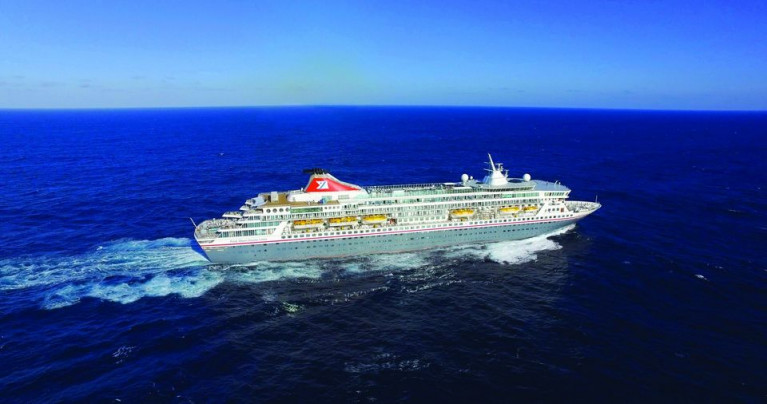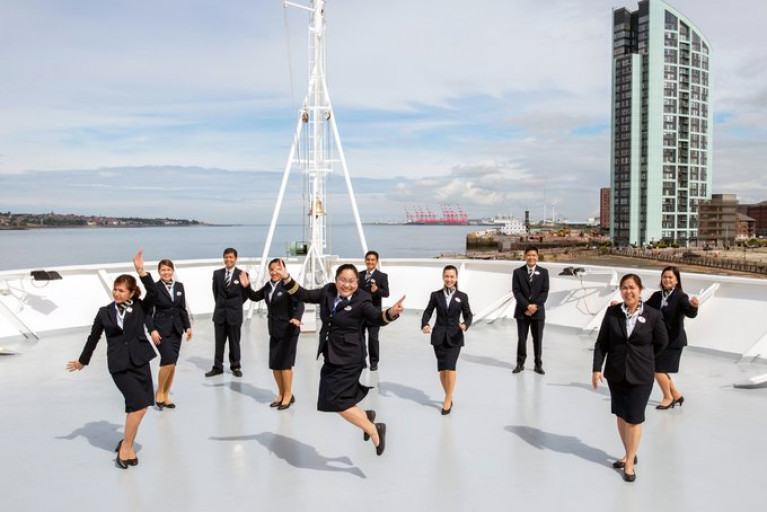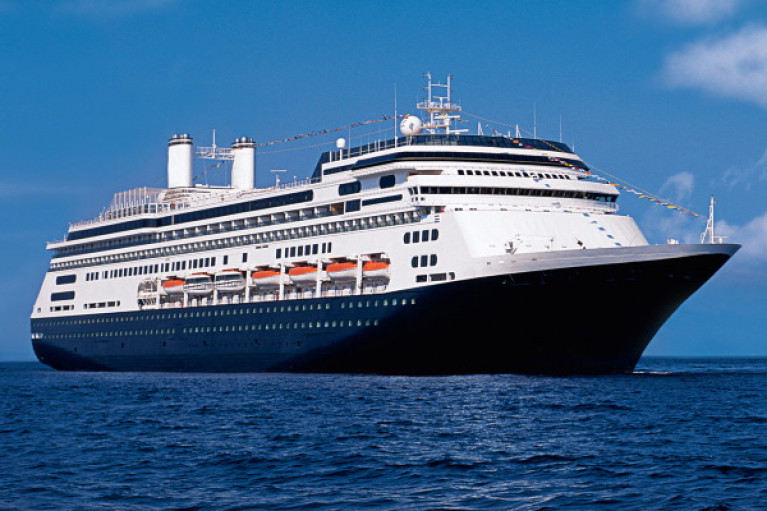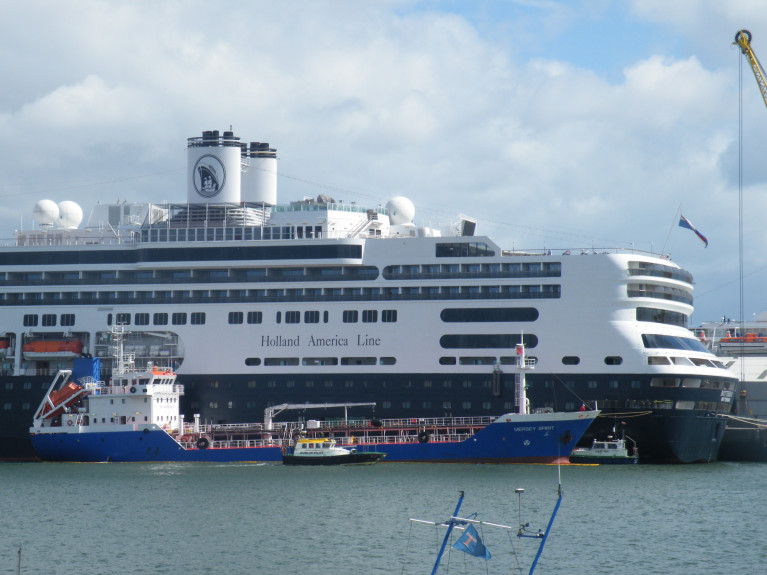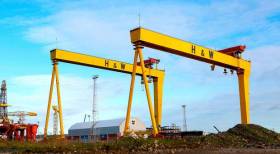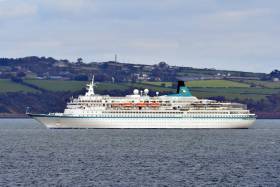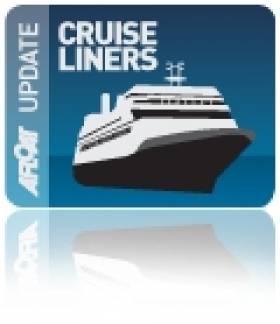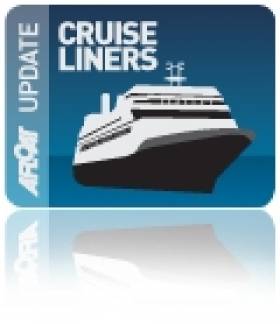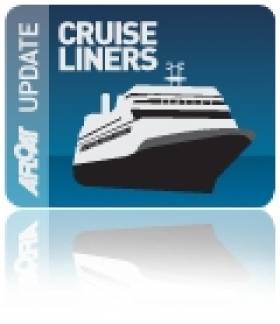Displaying items by tag: Fred Olsen
A dry-dock at A&P Falmouth has welcomed a 218-meter /1,325 capacity cruise ship which is operated by Fred. Olsen Cruise Lines.
Fred. Olsen cruise ships are regular visitors to Falmouth International Cruise Terminal, which is also operated by A&P. However, this is the first time the company has chosen to send its cruise ships to A&P for ship repair works.
The Balmoral’s programme of works includes steel inserts, ship side valves, tunnel thruster overhaul and underwater paint.
Eddie Purves, Group Managing Director at A&P Group said: “We are delighted that Fred. Olsen Cruise Lines has chosen to take advantage of A&P Group’s ship repair facilities.”
“A&P Group is the UK”s largest commercial ship repair operation. The combination of our three strategic locations, seven dry docks, fabrication services and wide-reaching skills and capabilities makes our facilities a first-class choice for cruise customers who operate in the UK and beyond.”
“A&P Falmouth is strategically located next to the English Channel and offers full drydocking facilities to medium size cruise ships with excellent on site machining capabilities.
“Falmouth’s International Cruise Terminal is a firm favourite with some of the world’s leading cruise companies, with vessels visiting the port for transit and turnaround calls.
“Our ambition is now to make A&P Falmouth and A&P Tyne a centre of excellence in cruise ship repair, minimising the downtime of customers vessels and enhancing the availability of their fleet.”
David McGinley, CEO said; “It has been fantastic to welcome Fred. Olsen's Balmoral into A&P Falmouth.”
“Contracts such as these help us to sustain our workforce, apprenticeship programme and supply chain which drives prosperity and adds real social value to the South West of England and beyond.
“We are delighted to welcome the MV Balmoral to Falmouth and look forward to developing our partnership with Fred. Olsen.”
Peter Deer, Managing Director at Fred. Olsen Cruise Lines, said: “Our smaller ships regularly call into Falmouth as part of our UK sailings, and it’s a town that we know our guests love to visit with us. “We are really pleased to be expanding this relationship with A&P Falmouth by working with them for a dry dock for our elegant Balmoral, as we get her ready for a return to service with us in early May.
“As a family-run cruise line, we know how important it is to support local communities. By docking in Falmouth, we are pleased to be supporting the local community here and the wider supply chain as Balmoral prepares to welcome her first guests back on board.
“We look forward to an even stronger working relationship with A&P Group both now and in the future.”
Fred Olsen Resumes UK Cruises As Part of Reopening Coupled with Newest Member to the Fleet
After many months away from operating due to pandemic, Fred Olsen Cruise Lines finally resumed with a maiden cruise by newcomer Borealis, albeit only within UK waters due to travel related restrictions, writes Jehan Ashmore.
Borealis departed Liverpool Cruise Terminal yesterday evening under the command of Captain Rommel, with his officers and crew welcoming cruise-goers on a much eagerly awaited three-night sailing around the Inner Hebrides, off the west coast of Scotland
The 'Borealis Maiden Voyage' setting off from Merseyside was also made more significant as it was the first operated by Fred Olsen in 2021.
The inaugural cruise follows that of the UK's cruise industry's first large cruiseship voyage also exclusively confined to domestic ports when MSC Cruises returned with a cruise last month. This saw MSC Virtousa include a visit to Belfast Habour.
As of today, Borealis is off West Scotland and bound for the Isle of Staffa. Among the notable scenic highlights will be sights such as Fingal's Cave on the Staffa, west of the Isle of Mull where Duart Castle was earlier passed this morning. Also included on the mainland will be Loch Fyne.
Borealis brings features including more balcony cabins and suites, an all-weather swimming pool with a retractable roof and a wide choice of restaurants, lounges and bars all designed with original artwork and premium décor. In addition, the Bahama flagged cruiseship has a classic two-tiered theatre, enabling guests to have great views of evening shows.
In advance of Borealis first cruise, Afloat had tracked the newest member of the four-strong fleet in Liverpool last Friday, following departure from the east Scottish port of Rosyth. This was to enable further sea-trials in the run up to the maiden voyage.
The cruiseship with a designed capacity for 1,400 passengers was the former Rotterdam along with a sister, Amsterdam, renamed Bolette, were last year acquired by Fred Olsen from Holland America Line. The cruiseship had been a caller to Irish ports.
HAL along with leading global cruise brands, last year had suffered from the major impact of Covid-19 which led to operators disposal of their more smaller and older tonnage. Though for Fred Olsen, the 60,000 gross tonnage vessels are relatively young, built between 1998 and 2000.
The pair directly replaced the ageing veterans Boudicca and Black Watch, early examples of purpose built cruiseships dating from the early 1970's.
Each of the 800 passenger capacity cruiseships originally built for Royal Viking Line, would later in their careers serve other operators and ultimately ending with Fred Olsen. This involved calls to ports throughout the island of Ireland.
Both vessels were disposed by Fred Olsen to become accommodation ships, however Boudicca more recently was sold and scrapped in Turkey.
Whereas Black Watch also in the Asian country, at the Port of Pendik is where Afloat tracked the ship one that is year short of its 50th anniversary. So the fate of this veteran vessel in a sea-going role remains unclear.
Former Irish Serving Cruiseships Delivered to Scotland to Began New Career for UK Operator
Cruiseships Rotterdam along with Amsterdam both acquired from Holland America Lines to the ownership of Fred. Olsen Cruise Lines have together met up in Scotland following a delivery voyage from Cyprus, writes Jehan Ashmore.
The pair custom built for HAL will serve new careers with the UK operator which introduced the secondhand meidum sized cruiseships to become part of the newly revamped Fred. Olsen fleet. Each of the 61,000 gross tonnage ships of the same series have a capacity for 1,360 (standard occupancy) and crew od 615. Asides restuarants and bars, they have swimming pools, spa, gym, sports courts and a 'culinary' theatre.
The Amsterdam on Friday having sailed under the Forth and Queensferry bridges headed to Babcock's Rosyth facility, where already in the basin was berthed Rotterdam (previously reported for Covid-19 related incident).
The Amsterdam is to be renamed Bolette (as flagship) whereas Rotterdam is now Borealis whose Captain Jozo Glavic this week proudly raised the Fred Olsen houseflag on board, as part of the new ship’s official handover ceremony at the Scottish south-east port.
The cruiseships directly replace the ageing sisters Black Watch dating to 1972 and the one year younger Boudicca which over the years were callers to Dublin, Cork and Belfast.
Cruises for 2021/2022 are available now on both Bolette and Borealis for those scheduled to start from March 2021, but all of this remains subject to the uncertainty of Covid-19 and related travel restrictions.
Afloat has noted that Bolette starts a 7-nights 'Scenic Scotland' cruise on 5 March with an embarkation in Southampton. Also from the English Channel port is where Bolette is also to depart on 12 March on a 6-nights 'Cities of the UK & Ireland' cruise.
Mid-Sized HAL Cruiseships Snapped Up Due to Covid by UK Operator Fred. Olsen Cruise Lines
UK based operator Fred. Olsen Cruise Lines which have been regular callers to Irish ports, has recently acquired a pair of secondhand mid-sized cruiseships due to the fallout of Covid19 which has severely impacted this trade sector globally, writes Jehan Ashmore
The new additions of Rotterdam (built 1998) and Amsterdam from 2000 (both of around 60,000 gross tonnage) are from Holland America Line.
(HAL) is one of several subsidiaries, among them the iconic name of Cunard Line and Princess Cruises of US giant, Carnival Corporation of Miami, Florida. In addition HAL have also disposed of older fleetmates Veendam built in 1996 and older Maasdam dating to 1993. Another fleetmate, Zaandam was centre-stage of a Covid-19 outbreak off Panama (also involving Rotterdam) before a port of call was permitted in the US to enable disembarking passengers among them Irish citizens.
As for the Fred Olsen destined pair Rotterdam and Amsterdam both built in Italy, they each just have a 1,400 passenger capacity. This will prove an ideal fit for the mid-sized cruiseship operator based in Ipswich, Suffolk bordering Essex where in Purfleet (operator CMV cruises this week collapsed). So it would appear based from industry sources that it was an opportune time for Fred Olsen to seize these secondhand vessels at an attractive price for such tonnage that remains relatively new.
The cruiseships also have relatively large cabins and suites and despite been built less than a quarter century ago, they have classic features such as teak decking and a fully encircling promenade deck, somewhat likewise of current long-serving sisters Black Watch and Boudicca. As for these former Royal Viking Line pair built in Germany and dating to the early 1970's, their future would seem even more in doubt given these more challenging times.
The announcement of the acquisition was made by Fred Olsen Jnr, chairman of the cruise line, whose Norwegian family shipping interests date five generations to 1848 but impressively expanded (incl. former owners of Harland & Wolff, Belfast). As for the current fleet, this comprises of five mid-sized cruiseships in addition a dedicated European continent based river cruising-vessel.
Returning to Rotterdam which when entering service in 1998 the newbuild became the 'flagship' of HAL in the year of the company's 125th anniversary, and having replaced the inherited namesake of the classic predecessor dating to 1959 which was withdrawn the previous year. This much smaller Rotterdam of some 38,000 gross tonnes however continued service as Rembrant for Premier Cruise Lines before taking up a static role as a floating musuem-hotel ship aptly in Rotterdam. So when the new Rotterdam was built with twin uptakes (funnels) this again retained a homage to the former classic trans-Atlantic ocean-going ship.
As for the Amsterdam and Rotterdam, they are to be renamed with typical Fred. Olsen fashion with the naming theme use of 'B' names, in these cases they are to be Bolette and Borealis. Along with new names, the pair will bring features including more balcony cabins and suites, an all-weather swimming pool with a retractable roof and a wide choice of restaurants, lounges and bars all designed with original artwork and premium décor. In addition a classic two-tiered theatre, enabling all to have great views of evening shows.
As at the moment, Fred. Olsen have paused cruises until the end of September, but given the situation is very changeable. The line among with other UK cruise operators including the industry's own body – CLIA, Public Health England and the Maritime and Coastguard Agency (MCA) are working to ensure safety and they all agree on the best protocols before they start sailing again and this work continues.
Fred Olsen also cited that their efforts is to ensure the operators policies are in line with the latest research and this has led to them developing a 'Safe Sailing Charter' to inform cruise customers on all the ways they are already keeping you safe on board our smaller ships.
In addition Pete Deer, Fred. Olsen Managing Director, emphasized to assure all guests who are due to sail with the line, that they will contact them at least 30 days before they are due to travel and have changed payment terms for this year to ensure guests know they do not need to pay their balance before they are sure they will be sailing.
In addition the line has introduced a 'Plain Sailing Guarantee' during these unusual times without clauses or caveats but this will only be applicable to guests on cruises departing in 2021.
For Sale As Harland & Wolff's Norwegian Owner Fred Olsen Instigates Restructuring Process
#BelfastLough - A famous icon of Belfast, Harland & Wolff is up for sale as its Norwegian parent company Fred Olsen carries out a major restructuring.
The former shipbuilder behind the Titanic reports The Belfast Telegraph, has diversified into renewable energy installations since the last ship sailed out of its famous yard in 2003.
The decline of shipbuilding has also been marked by a steady fall in employee numbers from as many as 30,000 in the 1930s to around 100 today.
Harland & Wolff: Shipbuilder an enduring chapter of Belfast story for more than 150 years
A sale would mark one of the biggest corporate transactions in Northern Ireland in recent years after three decades in the ownership of Fred Olsen.
Harland &Wolff covers two sites on Queen's Island in east Belfast, including the Belfast Repair Dock where some ship work is still carried out.
There is also the main building dock and manufacturing halls where the famous Samson and Goliath gantry cranes operate.
The combined surface area of the sites is nearly 90 acres.
The building dock is the biggest in Europe, and one possible use is for the construction of next generation very large vessels in excess of 500,000 tonnes.
Yesterday a spokesman said: "Harland & Wolff Heavy Industries Ltd can confirm that as part of wider restructuring activities, it is engaged in a marketing process that may lead to a potential sale of the business.
"The day to day running of the company is unaffected."
For much more on this development,click here.
Record-Breaking Cruise Season Ends As Black Watch Calls Time On Belfast
#CruiseLiners - It was a record-breaking cruise season that officially ended yesterday when the Fred Olsen-owned Black Watch (docked) in the Port of Belfast.
As The Irish News reports this was the 115th ship to dock in 2018, and since the arrival of the Portuguese-registered Astoria in mid-March, some 185,00 passengers and crew have spilled out into the city's shops, restaurants and tourist attractions.
Cruise Belfast, the partnership between Belfast Harbour and Visit Belfast, confirmed that the city has been named as one of Europe’s most popular cruise destinations by Cruise Critic, the world’s largest online cruise community, boosting 350,000 reviews covering 500 cruise ships and 300 global ports.
Cruise Critic chose Belfast a one of the winners of its third annual Cruisers’ Choice Destination Awards, which are based entirely on consumer ratings.
For more on the story click here in addition Afloat adds the 900 passenger /423 cabin cruiseship sailed overnight and is this morning docked at Liverpool Cruise Terminal.
More Cruise Ship Business For Rosslare Europort
#cruiseship – Rosslare Europort is to see more cruise business in 2016 with the announcement that the Fred Olsen Lines cruise ship MS Braemar will visit on 16th July next year.
MS Braemar has 485 cabins with capacity for 929 guests, and will include Rosslare as part of a Britain and Ireland cruise.
This follows last year's announcement that the cruise ship MS Albatros, operated by Phoenix Reisen, will visit Rosslare Europort on 5th August 2015.
As previously reported on Afloat.ie, the call by Albatros will represent the first Cruise Ship to visit Rosslare Europort in over 20 years.
Both visits follow the establishment of a Working Group led by the General Manager Rosslare Europort John Lynch, including representatives of Wexford County Council and Fáilte Ireland and supported by Visit Wexford, which has been working on developing the cruise business at Rosslare. The group has targeted further expansion of cruise ship business at the port.
General Manager of Rosslare Europort John Lynch said: "We are delighted to welcome the MS Braemar to Rosslare in 2016, as well as the MS Albatros to Rosslare this summer. We are fortunate at Rosslare that not only do we have the capacity to operate as a busy commercial port, but we are also situated in an area of outstanding natural beauty and rich cultural heritage and I believe that there will be many more Cruise Ships that will want to explore the wonders of Wexford and the South East."
An Apt Belfast Call Given Cruise Operator’s Relation to Harland & Wolff
#FredOslenH&W – Fred. Olsen Cruise Lines Boudicca (1973/28,551grt) docked this morning at Liverpool following an apt port of call to Belfast, given her berth facing opposite Harland & Wolff Industries is a Fred. Olsen related company, writes Jehan Ashmore.
Boudicca had berthed on the north bank of the Lagan directly across from H&W's Queens Island facility from where ships are dry-docked, repaired, converted in addition to where marine engineering projects are carried out on site.
Also facing opposite Boudicca, the historic pump-house that was used for the dock in which the RMS Titanic was built as previously reported, is to be transformed into a visitor centre for HMS Caroline.
Having completed her call to Belfast yesterday, Boudicca made her final-leg of the cruise when arriving in the early hours at Liverpool Cruise Terminal.
This cruise was the third out of four Irish Sea festive mini-taster cruises ranging from 1, 2 and 3 nights.
All the cruises start from Merseyside for UK guests booked with the 4-star cruise ship operator. During calls to Dublin Port, Irish clients embark from Ocean Pier within Alexandra Basin.
Since Afloat.ie's last report about Boudicca, the German built cruise ship had also made an interim cruise from Merseyside with calls to Dublin, Cork (Cobh) and Belfast.
On her final festive Irish Sea cruise, Boudicca is to depart Liverpool tomorrow night and arrive in Dublin on Saturday.
Passengers Picked-Up in Dublin Port for Direct Iberian Cruise
#FredOlsen - Boudicca (1973/28,388grt) of the Fred. Olsen Cruise Lines docked in Dublin Port yesterday to embark Irish passengers on a direct no flights cruise to Iberian ports, writes Jehan Ashmore.
The call to Dublin was to take senior citizens on a cruise supported by Active Retirement Ireland.
The four-star 880 passenger cruiseship's first port of call is to be the Portuguese capital of Lisbon. Other destinations are Portimao, Cadiz, Gibraltar and Vigo.
Prices for the 10 nights cruise which also incorporates a call to Gibraltar cost from € 1,184 per person.
Boudicca was originally Royal Viking Sky, one of trio of sisters commissioned for Royal Viking Line from a Finish shipyard. Her fleetmate Black Watch began her career as Royal Viking Star.
The final member of the handsome and well proportioned trio of cruiseships was launched as Royal Viking Sea. As previously reported this cruiseship currently serves Phoenix Reisen as their Albatros and her fleetmate flagship Amadea is visiting Cobh today.
Now in her third decade of service, Boudicca has operated for many owners and this is the ninth name in which she has carried.



























